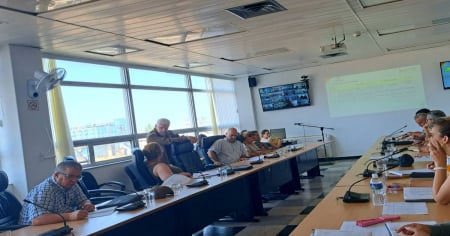The Cuban regime has announced the appointment of Ramiro Valdés Menéndez, a historical figure of the Revolution, as the leader of a government program aimed at stabilizing and recovering the national electrical system.
The decision, announced by Prime Minister Manuel Marrero Cruz during the Fourth Regular Session of the National Assembly of People's Power in its Tenth Legislature, comes amid a deep energy crisis that has been impacting the island for months, resulting in frequent blackouts that have caused unrest among the population and key sectors of the economy.
Marrero explained that the government program led by Valdés consists of various working groups aimed at reversing the critical energy situation, gradually meeting the demands of the population and the economy, and moving towards energy sovereignty and transition.
Among the key points, the Prime Minister emphasized that Cuba will not privatize energy generation, reaffirming the need to maintain state control over the sector, despite the lack of favorable results in its management. Additionally, there is a focus on more efficient and rational use of energy resources, as well as the implementation of measures to attract foreign currency through payments with domestically produced oil and nickel.
A key point in this program is the expansion of electricity generation capacity through photovoltaic parks. Marrero reported that by the end of the first half of 2025, over 500 MW of energy generated by solar panels will be added, with a projection of 1,800 MW by the end of next year.
In the previous session, the Minister of Energy and Mines, Vicente de la O Levy, highlighted that one of the goals of his "miraculous" plan is to recover 850 MW of capacity in distributed generation, complemented by generation from thermal power plants using domestic fuel, in order to achieve an average availability of 1,400 MW.
In addition, the installation of an additional 120 MW in photovoltaic solar parks is expected, thanks to a donation from China, with the first 35 MW set to arrive in early 2025.
It was also announced that there will be a salary increase for workers in the electrical sector, effective January 1, 2025.
The energy crisis in Cuba has deepened in recent years due to a lack of investment, fuel shortages, and the outdated infrastructure of the energy system. Power outages, which in some cases last up to 12 hours a day, have caused social unrest and difficulties in key sectors such as the economy and health.
Frequently Asked Questions about the Energy Crisis and the Role of Ramiro Valdés in Cuba
Why has the Cuban regime placed Ramiro Valdés in charge of the energy program?
The Cuban regime has appointed Ramiro Valdés, a historical figure of the Revolution, to lead a government program aimed at stabilizing and recovering the electric system amid a deep energy crisis. This decision seeks to reverse the critical situation, gradually meet energy demands, and advance towards energy sovereignty and transition.
What are the main measures of the energy program led by Ramiro Valdés?
The program includes the expansion of electrical generation capacity through photovoltaic parks and the recovery of 850 MW in distributed generation availability. It is projected to add more than 500 MW of solar energy by mid-2025 and reach 1,800 MW by the end of the year, in addition to implementing measures to generate foreign currency through domestic production of crude oil and nickel.
What impact does the energy crisis have on the daily lives of Cubans?
The energy crisis has caused prolonged blackouts, affecting the daily lives of Cubans and generating social discontent. These blackouts, which can last up to 12 hours, have negatively impacted key sectors such as the economy and health, exacerbating public unrest.
What obstacles does the Cuban regime face in resolving the energy crisis?
The Cuban regime faces several obstacles, such as a lack of investment, fuel shortages, and outdated infrastructure. Despite the announced plans, the results have been inadequate to address the energy crisis. Furthermore, poor management and reliance on foreign technologies complicate the implementation of effective solutions.
Filed under:
